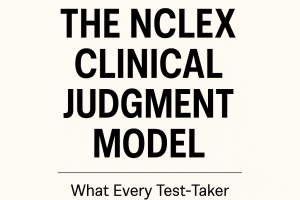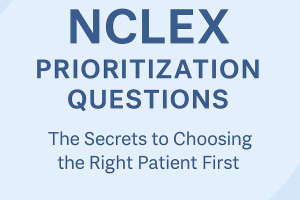THE ROLE OF THE NURSE IN CRISIS INTERVENTION

Introduction:
Imagine you’re a nurse, and suddenly, chaos erupts—a patient is in distress, emotions are high, and time is ticking. What do you do? Welcome to the world of crisis intervention, where nurses become the calm in the storm, guiding patients through their most challenging moments. This blog delves into the pivotal role nurses play in crisis intervention, blending professional insights with a touch of humor to keep things engaging.
1. Understanding Crisis Intervention:
Crisis intervention is like being the emergency plumber for human emotions—it’s all about providing immediate, short-term assistance to individuals experiencing an emotional or mental health crisis. The goal? To stabilize the situation, reduce immediate stress, and restore the person to their pre-crisis level of functioning. Think of it as hitting the ‘reset’ button but with more empathy and fewer tech skills.
2. The Nurse’s Role in Crisis Intervention:
Nurses are the frontline warriors in crisis situations, donning multiple hats (none of which are as fun as a party hat, unfortunately):
• Assessment Guru: Nurses swiftly evaluate the situation, identifying the nature and severity of the crisis. This involves understanding the patient’s mental state, potential risks (like harm to self or others), and available support systems. It’s like being a detective, but with more compassion and less trench coat.
• Intervention Specialist: Based on the assessment, nurses implement appropriate interventions. This could range from de-escalation techniques to administering medication. The aim is to alleviate immediate distress and ensure safety. Picture a superhero, but with scrubs instead of a cape.
• Referral Coordinator: Nurses connect individuals with necessary resources, such as mental health professionals or support groups, ensuring continuity of care beyond the immediate crisis. Think of them as the ultimate matchmakers, but for healthcare services.
• Educator Extraordinaire: Educating patients and their families about coping strategies and available resources is crucial. Knowledge is power, after all, and nurses are the power suppliers.
3. Essential Skills for Effective Crisis Intervention:
To excel in crisis intervention, nurses need a toolkit that’s more diverse than a Swiss Army knife:
• Effective Communication: Clear, concise, and compassionate communication is key. It’s about listening more than speaking—after all, we have two ears and one mouth for a reason.
• Critical Thinking: Nurses must analyze information quickly to make informed decisions. It’s like playing chess, but the stakes are much higher, and there’s no time for a coffee break.
• Emotional Resilience: Dealing with crises can be emotionally taxing. Nurses need to maintain their composure, which sometimes means perfecting the art of the deep, calming breath.
• Cultural Competence: Understanding and respecting cultural differences ensures that interventions are appropriate and effective. It’s about being open-minded—no passport required.
4. Challenges in Crisis Intervention:
While nurses are adept at handling crises, they face challenges that could make even a tightrope walker nervous:
• High-Stress Environment: The intensity of crises can lead to burnout. Self-care isn’t just a buzzword; it’s a necessity. Remember, you can’t pour from an empty cup—so keep that cup full (preferably with something more energizing than coffee).
• Resource Limitations: Sometimes, the necessary resources aren’t readily available, requiring nurses to be creative problem-solvers. It’s like being asked to make a gourmet meal with only a can of beans and a slice of bread.
• Emotional Toll: Constant exposure to crises can impact a nurse’s mental health. Seeking support and supervision is vital. After all, even superheroes need a day off.
5. The Impact of Effective Crisis Intervention:
When executed effectively, crisis intervention can be life-changing:
• Prevents Escalation: Timely intervention can prevent the situation from worsening, much like stopping a snowball before it becomes an avalanche.
• Promotes Recovery: Assisting individuals through crises facilitates quicker recovery and reduces long-term psychological effects. It’s like being the guide who helps someone find their way out of a maze.
• Strengthens Support Systems: Involving family and community resources creates a robust support network for the individual. Remember, it takes a village—not just to raise a child but to support anyone in crisis.
Conclusion:
Nurses are the unsung heroes in crisis intervention, providing immediate support, compassion, and expertise to those in need. Their role is multifaceted, challenging, and immensely rewarding. By understanding and appreciating the critical role nurses play in crisis intervention, we can better support these professionals as they continue to be the bedrock of our healthcare system. So, here’s to the nurses—the calm in the storm, the guiding light in the chaos, and occasionally, the ones who remind us to breathe.
Quiz Time!
Ready to test your knowledge? Here are some questions to ponder:
1. What is the primary goal of crisis intervention?
• a) To provide long-term therapy
• b) To stabilize the individual and reduce immediate stress
• c) To diagnose chronic conditions
• d) To prescribe medication
Answer: b) To stabilize the individual and reduce immediate stress
2. Which skill is essential for nurses during crisis intervention?
• a) Advanced surgical techniques
• b) Effective communication
• c) Financial planning
• d) Architectural design
Answer: b) Effective communication
3. Why is cultural competence important in crisis intervention?
• a) It helps in designing hospital infrastructure
• b) It ensures interventions are appropriate and effective
• c) It aids in financial budgeting
• d) It assists in technological advancements
Answer: b) It ensures interventions are appropriate and effective
4. What challenge might nurses face during crisis intervention?
• a) Excessive free time
• b) Resource limitations
• c) Lack of patient interaction
• d) Overabundance of support
Answer: b) Resource limitations
5. How does effective crisis intervention impact recovery?
• a) Delays the recovery process
• b) Facilitates quicker recovery and reduces long-term psychological effects
• c) Has no impact on recovery
• d) Complicates the recovery process
Answer: b) Facilitates quicker recovery and reduces long-term psychological effects
Remember, understanding the role of nurses in crisis intervention not only enhances our appreciation for these professionals but also underscores the importance of supporting them in their vital work.






